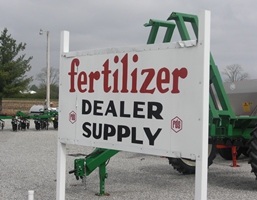David Muth of Alternative Equity Advisors recently spoke at the 2022 Land Investment Expo about the...
Ag Inputs Exempted from Tariff Policies Listed

According to a detailed list of carveouts published by the White House late last week, certain agriculture inputs will be exempt from the 10% across-the-board duties and higher reciprocal duties applied to specific trade partners.
Listed among the 37 pages of products excluded from the steep new duties are potash, certain herbicides and pesticides, peat, lumber products, lubricating oils, some energy products, and certain pharmaceuticals, including tranquilizers and vaccines for veterinary use. Diquat and paraquat are among the herbicides listed. Representatives from the agriculture industry, as well as farm-state lawmakers, had been pushing the administration in recent weeks for a slate of exemptions to any new duties.
According to economist Betty Resnick with the American Farm Bureau Federation (AFBF), "farmers and ranchers, like all Americans, will be paying more for many of the products they purchase, from seed for vegetable growers to tractors and other equipment made of steel. Some exemptions for products including potash and peat as mentioned above, which were hard fought for by agricultural organizations such as AFBF, are a testament to the effectiveness of farmers and ranchers raising their collective voice."
Ag industry representatives had been calling for exemptions to fresh produce and food products that the U.S. does not produce domestically, but none were included in the list of exempted products.
Even if the exemptions provide some price relief on critical inputs, they will do nothing to soften the blow of any retaliatory tariffs imposed by foreign governments. China responded to the new duties with a 34% tariff on all American exports last week. The European Union has also said it is assembling countermeasures.
Reuters' Emily Green and David Ljunggren reported that "Mexico and Canada avoided fresh tariffs with President Donald Trump exempting the United States' top trading partners from his new 10% global tariff baseline, although previous duties remain in place."
"Goods from Mexico and Canada that comply with the USMCA trade agreement between the three countries will largely remain exempt from tariffs, except for auto exports and steel and aluminum, which fall under separate tariff policies," Green and Ljunggren reported. "Trump previously imposed 25% tariffs on Mexico and Canada for not doing enough to curb migration and fentanyl trafficking, but later he issued a carve out for USMCA compliant goods."
Speaking after Trump's announcement, Canada's Prime Minister Mark Carney said he still planned to respond with countermeasures. “We are going to fight these tariffs with countermeasures, we are going to protect our workers, and we are going to build the strongest economy in the G7 (group of nations),” he said.
Potash Exemption Most Important, Experts Say
Reuters' Ed White reported in early March that "the U.S. imports 90% of the potash its farmers use, with 80% of those imports coming from nearby Canada, and it cannot replace that with domestic production."
"Full pass-through of the 25% tariff could increase prices by more than $100 per ton for potash supplies sourced from Canada, as reported in a February 4 analysis by a team from the University of Illinois and Ohio State University," White reported. "Farmers only make money on the difference between what they pay to grow a crop and what they can sell it for, so increasing costs by $100 per ton would be a major hit on farmer incomes."
While Canada is not the only potash supplier to the U.S., it is the closest. Russia and Belarus are the other major players, but they have been affected by the war in Ukraine, with sanctions and port bans hurting those countries' ability to export product.
Fertilizer is most farmers' biggest input cost. In 2024, the USDA estimated that 22% of total corn production costs come from fertilizer, and that includes labor, machinery and overhead expenses.
EDITOR’S TAKE:
Allowing the exemptions on many input items used on farms/ranches will help keep production costs down and improve margins. Famers/ranchers were among those most impacted by the trade disputes in the first Trump Administration. That said, additional trade agreements, government payments and excellent crops contributed to the highest net farm income in history. Could it play out the same way in 2025? Absolutely! There are already discussions about using tariff funds to help farmers weather the potential storm. It is too early in the game to know if, in fact, such payments will be necessary. The answer lies with how many countries capitulate and lower their tariffs on American goods and create a more balanced trade platform across the globe.
In the meantime, now is not the time to give up on sales to farmers and ranchers. In fact, it is the perfect time to use AgPack’s® amazing offer of over $45,000 of potential savings to help them with lowering their production costs. CADFI might also provide you with the leverage necessary to conquest that sale by bundling the financing to fit the farm/ranch income flow.








.jpg?height=200&name=Land%20auction%20sign%20(2).jpg)